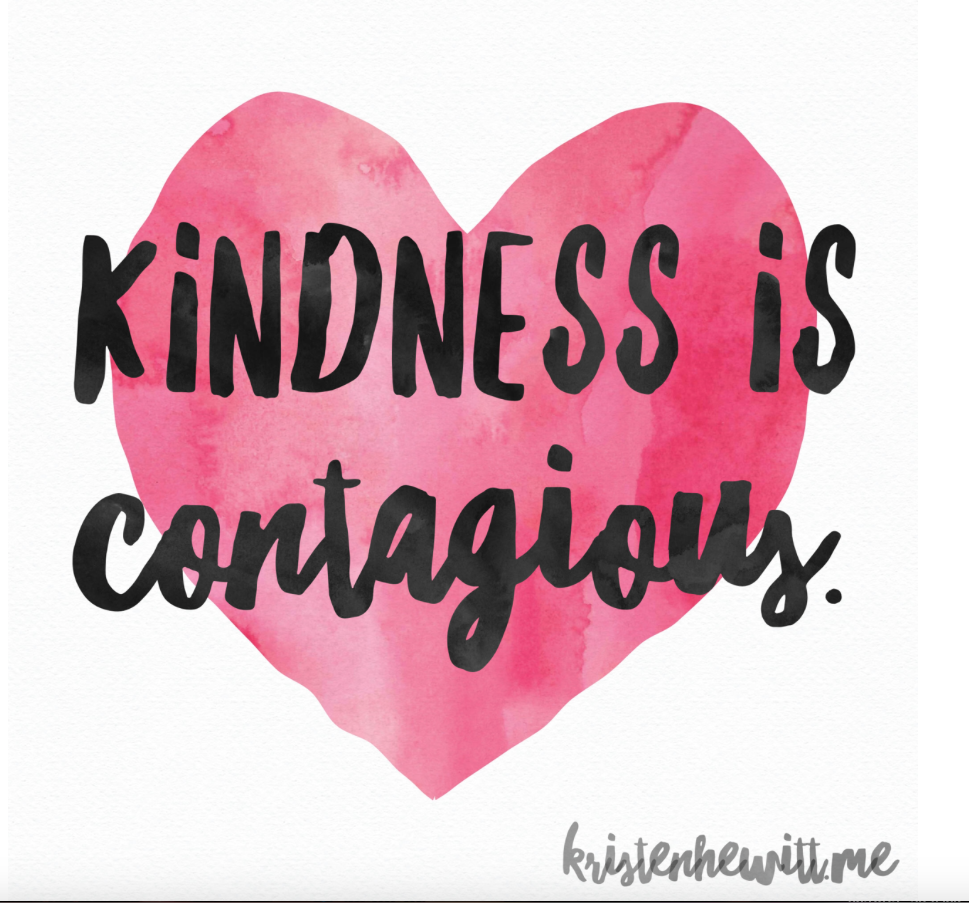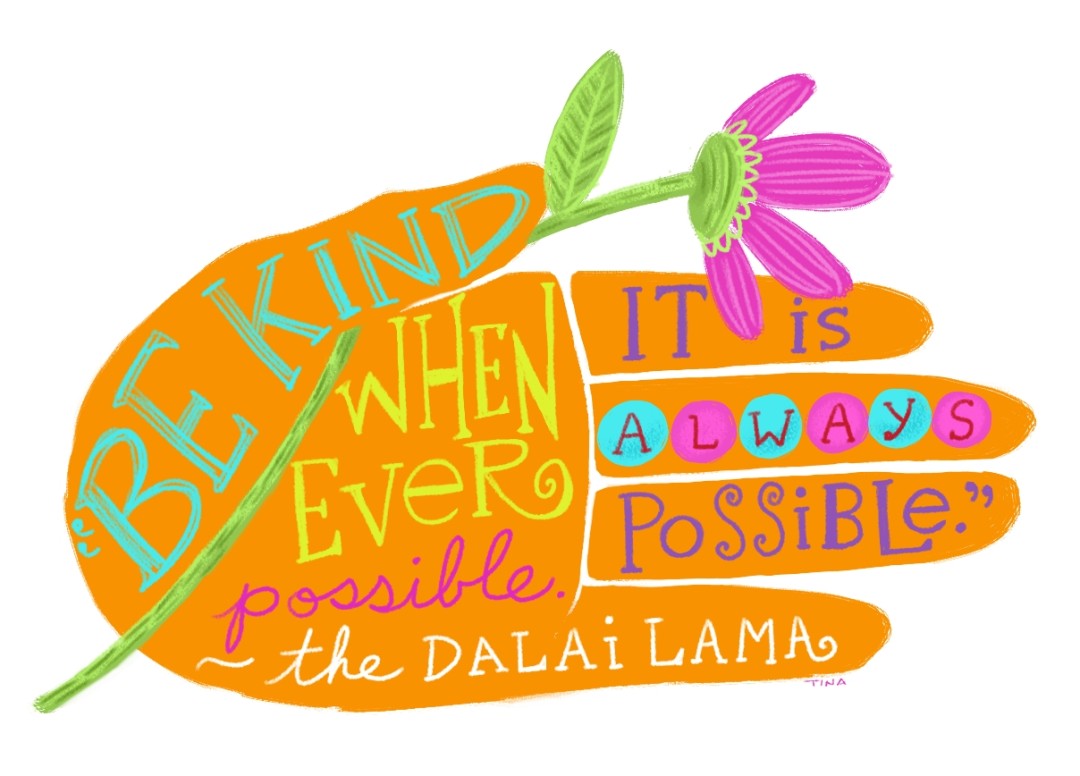There was a Jewish rabbi |
|||||||||
| “If you choose, you can make me clean.” Moved with pity, Jesus stretched out his hand and touched him, and said to him, “I do choose." Read Mark 1:35-45 | There’s this great sermon illustration ministers love to use to teach the virtues of telling the truth. Taking a clear glass of water, we add a drop of food coloring to represent how one little lie can change the way a person might see or trust you. It’s hard to remove that lie once it’s been placed in that person’s heart. But what if each drop didn’t represent a lie, but instead a random act of kindness? It will still change the way a person sees or trusts you. And it too is hard to remove from a person’s heart. Kindness is such lovely word isn’t it? There’s absolutely nothing mean about it. In fact, it has the word kind it in so it can’t be bad. Think about how it makes you feel when people are kind to you? Perhaps that’s why kindness is one of the most beautiful human attributes, or why so much ink has been spilt writing about it. |
Yet still some choose not to be kind. Maybe they’re too tired and grumpy. Or perhaps something horrible has happened in their life that has made their heart angry or bitter. Whatever the reason, they’ve lost that gene or natural instinct to be compassionate towards others. We don’t like mixing with these people – which only seems to exasperate the problem. Kindness can be infectious.
Today’s message is simple: We chose to be kind. Or we chose not to be. It’s that cut and dry. For some it’s hard, and takes a concerted effort. For others it’s as easy, and involuntary as breathing.
There is a story about Gandhi who lost a shoe while stepping onto a moving train. Unable to retrieve it from down on the track, Gandhi took off his other shoe and tossed it near the first. When a fellow passenger witnessed this unusual act, he asked Gandhi why he did what he did?
Gandhi smiled. “The poor man who would have found my shoe lying on the track will now have a pair he can use.” What I love about this story is how Gandhi didn’t think twice about doing something good for someone he would never even meet.
We either choose to be kind or not.
Not to compare my wife with Gandhi, but she has a habit of paying the toll for the car behind her. She will never meet that person, but her choice speaks volumes to the kind of world she desires to live in.
Human beings make thousands of choices every day - What should I wear or what should I cook for dinner? Most of our choices are so innocuous that we don’t even think about them. Swatting a pesky fly or choosing to run up the stairs instead of walk.
But there are choices we have to consciously make. For example, should I give this panhandler money today, and if so, how much am I willing to give? Or how much am I able to spare? What will he do with the money? Each one of these choices can have a major impact on you as well the other, your community, and even the world. For you never know who is watching.
There was a woman at the freeway off-ramp who looked lost in sadness. She seemed invisible to most drivers. I seemed to have surprised her when I said hello and began to talk with her because nobody had offered to help muchless offer a smile. She introduced her dog to us, and we shared a couple of laughs, and then I gave her a blessing and told her she was loved. What I didn’t know is that my neighbors were behind us, witnessing the action; and their heart was changed. We either choose to give or we choose not to.
Long before Gandhi or Kathleen, there was a Jewish rabbi who saw every human being as an opportunity to do something kind for that person. His name was Jesus. And by the choices he made, our eyes would be opened to see God in our midst. And our hearts would learn how to share God’s love as wildly and recklessly through random acts of kindness. All so others would be able to see God and receive God’s love and grace.
The gospels offer us a plethora of examples of Jesus choosing to be kind to people. Our reading from Mark’s gospel illustrates how Jesus made a conscious choice to help another fellow human being.
Like the Syrophoenician woman we talked about last week, the leper challenges Jesus – not by pushing back intellectually as she did, but by appealing to Jesus’ heart. “If you choose,” he says, “you can make me clean.” I imagine this man today being the woman at the freeway off-ramp of the freeway with a cardboard sign that says, “If you choose, you can help me get shelter tonight.”
Jesus has a choice. He can show kindness to this contagious stranger or move to a safer place where people aren’t sick or dirty or in need of something. This is one of the reasons I love Jesus so much. He knows me and still chooses to be with me. He hears me whining and complaining and still doesn’t to give up on me.
Because Jesus decided to act with compassion and kindness, the man’s life was forever changed. His body was restored. He could return to his family and friends, hopefully get his old job back and begin to live a normal life again.
He could return to the synagogue that had cast him out because of his sickness, and he could even testify there to God’s glory because of what he had witnessed – all because Jesus chose to do something kind for a stranger.
The good news is Jesus chooses you as well. He chooses to share God’s love and grace with you – even if it takes the greatest act of kindness in order to do so. That’s how important you are to God.
If we choose Jesus, to put our faith in his words and show kindness the way he did, then we too can do some amazing things too! It’s like Mark Twain said, “Kindness is the language which the deaf can hear and the blind can see.” If we choose it, we can do it.
We know how human kindness works in times of disasters like a hurricane, or in times of crisis like Sept. 11th. Strangers help strangers like they’re one of our own. But once the news chases the next story, so to goes our attention and charity.
As long as there are homeless living on our streets, we will always be in a time of crisis. They are the lepers of today. Drug addicts are the possessed. Illegal immigrants are the aliens living on our land. Then there are the widows and orphans. And the incarcerated.
God knows that when we see a person who is suffering, or someone who is lonely, thirsty, hungry, poor or in need of special care we have a choice: to be… or not to be… like Jesus who said, “the least you do to one of these my brother or sister, you do also to me.”
No matter a person’s social status, skin color, national origin, gender or sexual orientation, or even political affiliation, the blood that Jesus shed on the cross, the life he willingly chose to give to us, has united the world to one divine love; a love that God chooses to freely give to anyone who wants it.
Think about the food coloring and water. If one drop of Jesus’ blood can transform all of humanity, then imagine what a billion drops of kindness can do when practiced daily all around the world. Kindness is infectious and contagious, which is why we need to share it and spread to infect the world with God’s love.
To quote Steve Sjogren from his book Conspiracy of Kindness, ‘Small things done with great love are changing the world.’ This is his church’s motto. And it should be ours as well. Each week they leave the church looking for ways to do random acts of kindness and bearing the good fruit of the Holy Spirit.
This week I’m giving you the same challenge. I want you to do at least one random act of kindness in your community.
It could be a smile, a text message or a note with words of encouragement, or a gesture of support. You could buy the coffee for the person behind you in line, or simply put down your phone to give someone your full attention.
They don’t have to be homeless or destitute. As Jesus taught us, every person is an opportunity to show not only kindness but to spread God’s love throughout the world…one drop at a time.
Works Cited
Cook, John. The Book of Positive Quotations, 2nd Ed. Minneapolis: Fairview Press, 1993.
Nouwen, Henri. Bread for the Journey. New York: HarperCollins, 1996.
Suttie, Jill. How to start a kindness revolution. feb 16, 2018. https://greatergood.berkeley.edu/article/item/how_to_start_a_kindness_revolution (accessed sept 14, 2018).
| oow_2018.16.09.pdf | |
| File Size: | 119 kb |
| File Type: | |
randomactsofkindness.org
Kindness.org
10 Rules for Addressing Panhandlers
Leave a Reply.
Rev. Ian
has been blogging under the name: Jesus not Jesús: Looking for Christ in the face of strangers. You can read his posts and browse his archives by clicking here.
Sermon Archives
November 2021
October 2021
September 2021
August 2021
July 2021
June 2021
May 2021
April 2021
March 2021
February 2021
January 2021
December 2020
November 2020
October 2020
September 2020
August 2020
July 2020
June 2020
May 2020
April 2020
March 2020
February 2020
January 2020
December 2019
November 2019
October 2019
September 2019
August 2019
July 2019
June 2019
May 2019
April 2019
March 2019
February 2019
January 2019
December 2018
November 2018
October 2018
September 2018
August 2018
July 2018
June 2018
May 2018
April 2018
March 2018
February 2018
January 2018
December 2017
November 2017
October 2017
September 2017
August 2017
July 2017
June 2017
May 2017
April 2017
Sunday at 11:00 a.m.


 RSS Feed
RSS Feed

